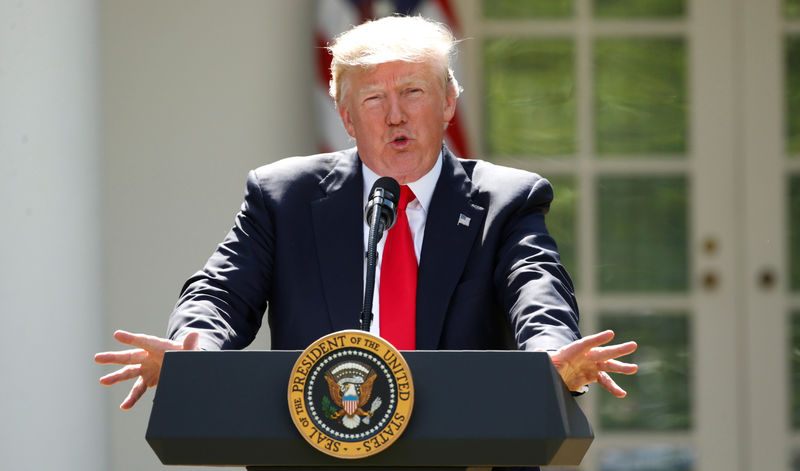By Nina Chestney
LONDON (Reuters) - Washington's withdrawal from a global pact on climate change might give U.S exports a competitive advantage but supporters of the deal will struggle to respond with any carbon tariffs due to the complexity of keeping them within international trade rules.
President Donald Trump said on Thursday the United States would quit the Paris Agreement because it hurt the U.S. economy, although U.N. regulations mean any withdrawal would take four years.
Leaving might give U.S. exporters an edge over rivals in nations where industry has to pay to emit carbon dioxide through a carbon tax or emissions trading scheme, economists say.
But the Paris deal sets no penalties for withdrawal and says efforts to ensure compliance should be "non-adversarial and non-punitive", leaving it up to governments or trade blocs to ensure any retaliation meets World Trade Organization (WTO) codes.
Some manufacturers are already fretting about the U.S. competitive edge. But European and other nations have shown no appetite for responding with a regime of carbon tariffs.
"Our view is that it's a can of worms to avoid opening," said Dirk Forrister, president and chief executive of the International Emissions Trading Association (IETA).
"It's a topic some politicians will raise again but it would be very complex and disputes would end up at the WTO," he said.
Germany's VDA lobby group for the country's powerful vehicle industry voiced concerns on Friday that its carmakers could lose out. Yet Europe's top exporting nation has said it was not considering any sanctions.
U.S. neighbor Canada also dismissed the idea of slapping on carbon tariffs. "The Canadian team (at U.N. climate talks) never even envisaged such a thing, let alone discussed it with anyone," said a Canadian source close to the matter.
EU Climate and Energy Commissioner Miguel Arias Canete told Reuters the 28-nation bloc was not considering any tariff action against the United States.
France, home of the 2015 Paris climate change accord, said its response was to redouble efforts to limit carbon emissions and pull other signatory countries along with it.
The White House did not immediately respond to a request for comment.
The European Union has in the past examined the possibility of imposing import tariffs on nations with lax polluting laws. A study in 2010 was prompted by France and Italy which worried their industries would lose out to cheap imports.
PRINCIPLE VS PRACTICE
The EU assessment proved such a regime would be complex to calculate, create an administrative burden and risk a trade war.
It showed levies could in principle comply with WTO rules, but that in practice it would be almost impossible to target individual imports without knowing and monitoring the amount of carbon emitted throughout the manufacturing process.
WTO rules would allow a WTO member to impose tariffs on another for failing to reduce greenhouse gas emissions, said James Bacchus, a director at the International Centre for Trade and Sustainable Development and a former WTO official.
He added that this would be the case "if enacted solely as an environmental or health measure, and if applied in a way that does not constitute arbitrary or unjustifiable discrimination or a disguised restriction on international trade."
Such action would have a stronger case if the WTO member targeted "has declined to participate in cooperative global climate action as a party to the Paris Agreement," he said.
Britain, Brazil, Canada, China, France, Germany, India, Japan, Mexico and South Korea are among the 15 biggest exporters to the United States. Many of them have introduced or are planning to introduce carbon pricing mechanisms.
But, even if they felt their industry faced a competitive threat and chose to respond, it would not happen quickly.
"It would have to go through a legislation process so it wouldn't happen as an immediate reaction. It would take a while to develop," IETA's Forrister said.
Washington's own actions in the past show this. In 2009, the U.S. Clean Energy and Security Act contained provisions for the government to act against trade partners which failed to meet U.S. emissions standards and so gained a competitive advantage.

The step drew criticism from China, largely seen as the main target at the time. But the bill never made it to a Senate vote.